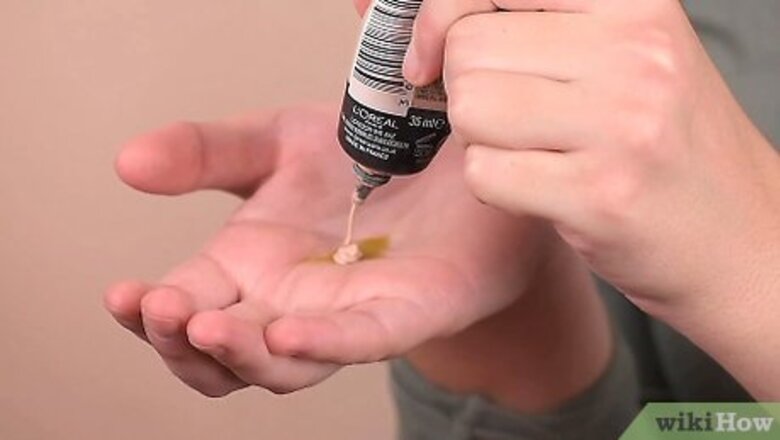
views
Quick Fixes
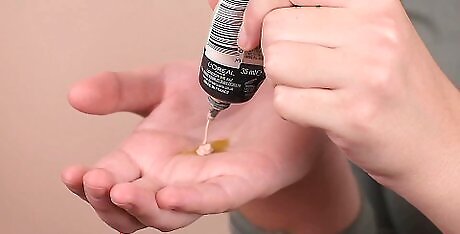
Add face oil to your foundation for a glowy look. Place 1 or 2 drops of a lightweight face oil into your palm. Then, add a dime-sized amount of your normal foundation, and blend them together in your hand. Use the fingers of your opposite hand to pat the foundation onto your face. Look for an oil made of natural ingredients like jojoba, coconut, sunflower, or grape seed. If your skin tends to get a little oily throughout the day, go over your face with a light dusting of translucent face powder. However, don't use too much, or your makeup will look heavy. You can use a makeup sponge or foundation brush instead of your fingers, if you like. However, using your fingers may give your skin a dewier appearance.
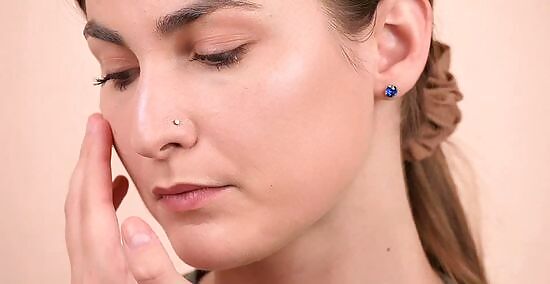
Apply highlighter to your cheekbones and the high points of your face. There's no easier way to fake a sunkissed glow than with highlighter. Gently tap a little highlighter across the tops of your cheekbones. If you'd like, you can also add some anywhere the light would naturally hit your face, like the center of your forehead, the bridge of your nose, the V on top of your lips, and the center of your chin. Cream highlighter may give you the most natural appearance, but you can also use a shimmery powder highlighter if you prefer. If you're using a cream highlighter, tap it onto your skin with your fingertips. If you're using powder, use a fan brush to lightly pat the highlighter onto your skin wherever you want a glow.
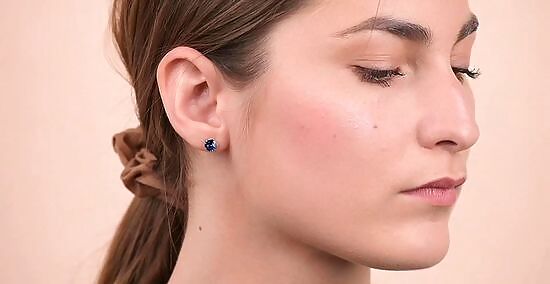
Use cream blush or stain to give your skin a natural flush. Cream blush is a great way to add a little color to your cheeks while still looking perfectly natural and glowing. Just graze your finger across the top of the pot, then tap the color where you want it until it's blended in. If you use powder with your foundation, apply cream blush or stain before your powder. Cream products don't layer well over powders. If you already applied the powder, use a powder blush that mimics the color of your cheeks when you get flushed. Try using your cheek color on your lips and even your eyelids to brighten up your whole face.
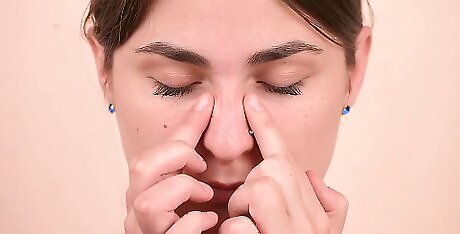
Massage your face to brighten your skin quickly. Place one of your thumbs right between your eyebrows, then roll it in a gentle circular motion for about 10 seconds. Then, use your ring fingers to trace 2 or 3 circles from the inside corners of your eyes, up over your eyebrows, and back under your eyes. This can boost circulation in your face, and it can also help reduce excess fluid that can make your face look puffy and tired.
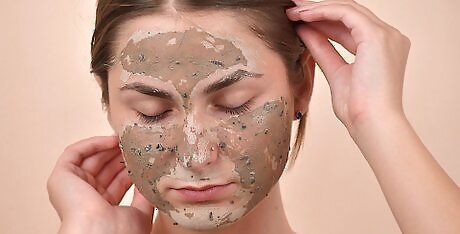
Try a brightening mask if you have an extra few minutes. Drape a hydrating or brightening sheet mask over your skin, or smooth on your favorite moisturizing mask, then sit back and relax. This will allow the mask to penetrate into your skin, leaving you with a refreshing glow that will last all day. However, avoid letting the mask dry out completely—otherwise, it could actually strip moisture from your skin when you remove it. Look for a mask that includes ingredients like vitamin C, niacinamide, and arbutin. Some hydrating masks are meant to be worn overnight. In that case, you don't have to worry about whether it dries out. You can even make your own hydrating mask by mixing up nourishing ingredients like avocado, coconut oil, honey, yogurt, and aloe vera gel.
Skincare Routine
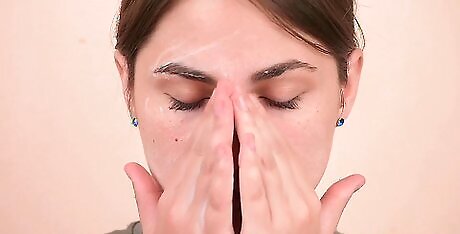
Wash your face with a gentle cleanser. If you want to look radiant, it's essential to start with fresh, clean skin. First, wet your face, then dispense a dime-sized amount of face wash onto your fingers. Use your fingertips to gently massage the cleanser over your entire face, except for your eye area. Then, use clean water to rinse the cleanser away from your skin. Use a face wash that's made for your skin type. For instance, if you have dry skin, you might opt for a gentle moisturizing cleanser. If you're prone to breakouts, you might use a cleanser with acne-fighting ingredients like salicylic acid or benzoyl peroxide. If you want the skin on your body to glow, be sure to wash all over with a gentle soap or body wash when you take a shower.
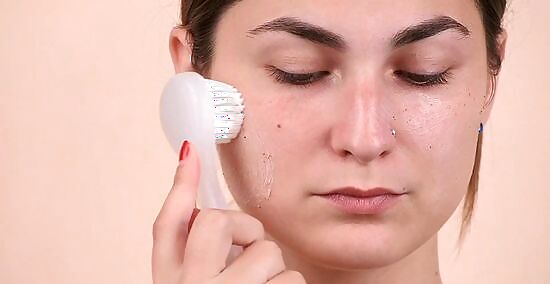
Exfoliate your skin to remove dead skin cells. Exfoliants help get rid of old skin cells that might be leaving your skin looking dull and rough. You can use either a physical exfoliant, like a scrub or a brush, or a chemical exfoliant that will gently dissolve away the dead skin. Although chemical exfoliants might sound intense, many of them are much gentler than using physical exfoliants. If you have sensitive skin or you use a stronger exfoliating method, you'll need to exfoliate less often—maybe only once a week or so. If you use a gentler method, you can exfoliate up to 2-3 times a week, but cut back if you notice your skin seems red, irritated, or especially sensitive, or if you notice dark spots forming on your face. Be sure to only use one exfoliating method at a time. For instance, if you're using a scrub on your body in the shower, you wouldn't also use a brush, as that would likely be too intense.
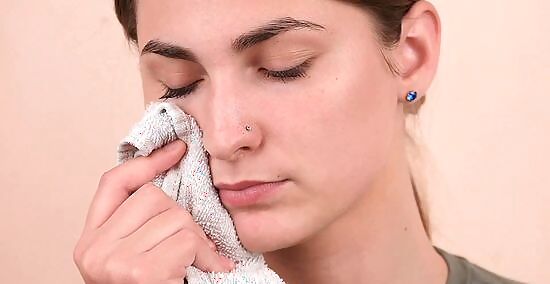
Blot your skin dry with a soft towel. Now that you've gently cleansed and exfoliated your skin, it's time to dry off. Take a little extra time to carefully pat your skin dry, rather than just rubbing it roughly, as that will help protect it from becoming irritated and dry. Use a soft, fluffy towel when you're drying off, as well. It's okay if your skin is still a little damp after you dry off. If you moisturize while your skin is still a little damp, you'll help trap in moisture that will leave your skin looking hydrated and healthy.
Moisturize the skin on your face and body. Gently pat a thin layer of moisturizer onto your face, but don't rub it all the way in—instead, leave a little to absorb into your skin on its own. While you're waiting for your face cream to soak in, apply body lotion to your arms, legs, shoulders, chest, and anywhere else you want your skin to glow. Use a lightweight lotion that's formulated for your skin type, and be sure to use separate moisturizers for your face and body. The skin on your face is thinner than the skin on your body, so body lotion will be too thick for your face, and it could clog your pores. If you have sensitive skin, choose a fragrance-free, mild moisturizer that won't irritate your skin.
Healthy Living

Eat a healthy diet rich in fruits and veggies. Make sure your skin is healthy and glowing by getting plenty of healthy fats and vitamins in your diet. To do that, try eating foods that contain: Antioxidants: These fight free radicals that cause skin damage. They're found in foods like grapes, nuts, and berries. Essential fatty acids: Fatty acids fight signs of aging and are found in foods like fish, shellfish, leafy vegetables, sesame seeds, avocados, and walnuts. Vitamin C: Vitamin C may help boost collagen production in your skin. It's found in a variety of foods, including citrus fruits, chili peppers, parsley, and black currant. Carotenoids: These are vitamin A derivatives. They act as antioxidants and may help protect against sun damage. They're found in carrots, sweet potatoes, pumpkins, mangos, and papaya. Vitamin D: Vitamin D may help fight off skin infections. It's naturally produced when you spend time in the sun, but it's also found in fatty fish, egg yolks, and vitamin-D-enriched foods.

Stay hydrated by drinking plenty of water. Although experts are somewhat divided on the effects hydration has on your skin, there's a good chance that being dehydrated could make your skin look dry and dull. To be sure you're giving your skin the best chance at being glowy and fresh, drink plenty of water throughout the day. Drinks like juice and soda do count towards your total fluid intake for the day, but keep in mind that extra sugar could potentially make you more prone to acne breakouts.
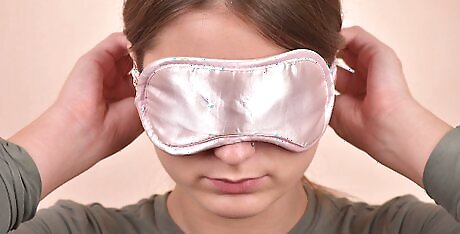
Get a good night's sleep. Nothing will zap your natural glow like being exhausted. If you don't get enough sleep, you'll probably notice dark circles under your eyes, swollen eyelids, and pale skin. On the other hand, sleeping well will leave you looking bright and refreshed in the morning. To help yourself sleep better at night, try these tips: Go to bed and wake up at the same time every night, even on weekends. This will help your body settle into a natural routine, making it easier to fall asleep when you need to. Keep your room cool, quiet, and dark. You need to be comfortable to sleep well. If you need to, put a fan in your room or add room-darkening shades to your windows. Avoid nicotine, caffeine, and alcohol before bed. Nicotine and caffeine can make it hard to fall asleep, while alcohol can make it harder to stay asleep throughout the night. Put away your phone or tablet at least an hour before bed. The blue light from these screens can make it hard to fall asleep.

Exercise 30-60 minutes a day. Exercising regularly may help give you clear skin by improving your circulation, regulating your hormones, and relieving stress. It's easier to stick to an exercise routine if you're having fun, so try activities you enjoy, like playing sports, taking scenic hikes, swimming, or taking dance classes. Just be sure to wash your face after you exercise! Otherwise, the sweat might actually make your acne worse.

Make time in your day to relax. Being stressed is bad enough, but it's especially hard to hide how you're feeling when it starts to show on your skin. To help prevent that, make relaxation a priority every day. Exactly how you relax will depend on the things you enjoy, but here are some common approaches: Deep breathing exercises Meditation Yoga Vigorous activity Spending time with family, friends, and pets Journaling, creative writing, or making art, music, or crafts Singing
Skincare Ingredients
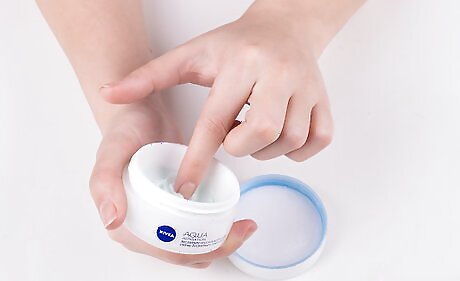
Replace your regular moisturizer with a brightening product. Moisturizing will go a long way toward giving you beautiful, glowing skin—but some skincare ingredients are more effective than others at giving you a radiant look. To get an extra glow, moisturize after you wash, just like normal. However, instead of a plain moisturizer, use a product that's labeled with something like "brightening" or "radiance." These products are generally designed to give your skin a fresh, dewy look. Some brightening products might have a little bit of a shimmer to give your skin an extra glow. If a brightening product uses chemical exfoliants like vitamin C, AHAs (including glycolic and lactic acids), and BHAS (like salicylic acid), avoid using other exfoliating products at the same time. This could cause your skin to become sensitive or irritated. Unless it's directed by a doctor, avoid products that contain hydroquinone—this skin lightener can sometimes have serious side effects and is associated with an increased risk of skin cancer.
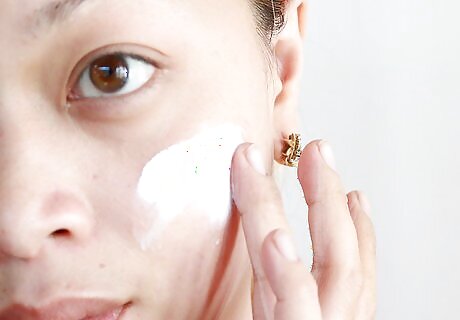
Use skincare products with hydrating humectants. When you're choosing a moisturizer or serum, look for one that contains humectants like glycerine and propylene glycol. These ingredients will help attract moisture into your skin, leaving you looking healthy and glowing. Hyaluronic acid is a humectant that's really popular right now. This ingredient is more than the latest trend, though—it attracts and holds up to 1000 times its weight in water. That type of hydration will leave your skin looking plump, smooth, and glowing.
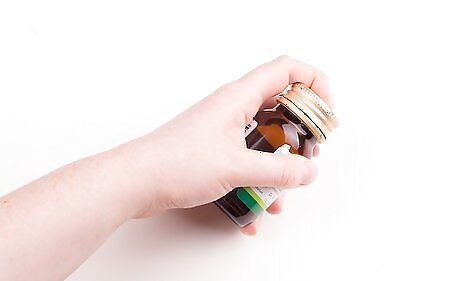
Look for vitamin C in the form of ascorbic acid. Ascorbic acid is a form of vitamin C that can penetrate the skin. It can help your skin look more plump and firm, and it may help promote healing in the skin. In addition, it helps fight off free radicals that can age you and make your skin look dull. You may see vitamin C in skincare products, but if it's not formulated as ascorbic acid, it may not be able to penetrate deeply enough into your skin to give you results.
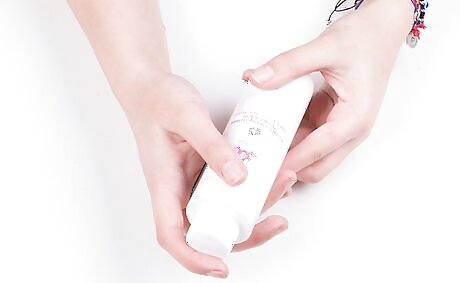
Try niacinamide to even your skin tone. Niacinamide, or vitamin B3, may help reduce fine lines and wrinkles while evening out your skin tone. It can also help minimize the appearance of your pores, giving your skin a smoother look. Vitamin E is another vitamin that's frequently used in skincare products because it hydrates your skin and neutralizes free radicals.




















Comments
0 comment